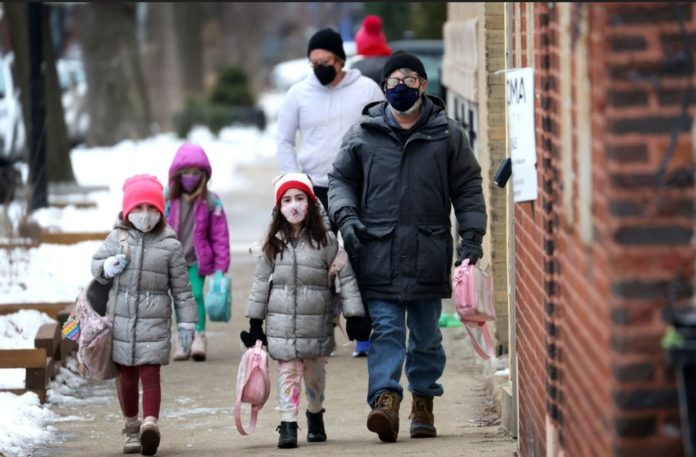“The virus will become endemic,” says everyone, even if they differ on what that word means.
On Tuesday, the Center for Systems Science and Engineering at Johns Hopkins University said that the number of known coronavirus cases in the world had reached 400 million. This is just one month after the number of known cases reached 300 million.
It’s a startling rise, fueled by the highly transmissible Omicron strain, as governments and individuals throughout the world grapple with how to deal with the pandemic’s next stage.
A lot of time went by before the world reached 100 million confirmed infections. The first cases were found in late 2019 and the 100 millionth in January 2021, which is more than a year. That number was doubled in seven months, and it will be doubled again in six months. Although daily case counts have begun to fall, more than 2.7 million infections have been recorded on a daily basis.
It’s very likely that the number of cases is much higher, and it could be a lot. Many at-home rapid test results are unreported, and not all infected people are tested because they lack access, have no symptoms, or choose not to be.
Almost five billion people have gotten at least one dose of a coronavirus vaccine while the virus has changed, and research shows that vaccines still provide protection against the worst effects.
Since the current, dominant strain of the virus – Omicron – is less likely to result in hospitalization or death, case counts have become less relevant as a statistic, at least in areas where vaccination or prior infection rates are greater.
Cases in New York City, for example, jumped 541 per cent this winter over last, while mortality rose only 44 per cent.
However, experts warn that infection resistance may fade over time, and future varieties may be better able to circumvent our defenses.
Despite this, several governments have eased restrictions as Omicron-fueled surges have decreased in many regions. Australia will soon reopen its borders to travellers who have been vaccinated. Following in the footsteps of Denmark and Norway, Sweden is removing the majority of its pandemic laws.
California, Connecticut, Delaware, New Jersey, and Oregon governors said this week that statewide indoor mask laws, some of which extended to schools and others to public spaces, would be repealed.
In an interview with Kaiser Health News on Tuesday, Dr. Celine Gounder, an infectious disease expert and public health researcher, said that whether such relaxations were appropriate or premature depended on the local context, including vaccination rates, infection rates, and hospitalization rates relative to hospital capacity.
Within the US, “if there’s anywhere that’s in a position to dial back on mitigation measures, it would be parts of the Northeast”, Dr. Gounder added. She did, however, express surprise at the choice to do so statewide in California, where local circumstances differ substantially.
The moves reflect people’s tiredness two years into the pandemic, as well as a recognition that the coronavirus is here to stay in some form. But it’s unclear how that will look. “The virus will become endemic,” says everyone, even if they differ on what that word means.
Endemicity can, but does not always, imply a low-level threat. In many places of the world, the common cold is endemic, as is malaria. Vaccination rates and other factors will likely determine whether the coronavirus poses a bigger or smaller hazard in different areas. New varieties could further complicate the scenario, especially given the fact that billions of people remain unvaccinated around the world.
According to the University of Oxford’s Our World in Data project, only 11% of individuals in low-income nations have gotten a dose of coronavirus vaccine, compared to 78% in high- and upper-middle-income countries.
With only 15.4 percent of the population receiving at least one dose of immunization, Africa has the lowest vaccination rate of any continent. Despite vaccines, some people with disabilities, chronic illnesses, or weaker immune systems remain vulnerable.
And the coronavirus is still doing havoc, particularly in the United States, where the virus has killed significantly more people than in other wealthy countries.
Over 5.7 million individuals have died as a result of the virus globally, with over 900,000 in the United States alone. Every day, the United States reports 2,598 additional deaths, the equivalent of a calamity on par with Pearl Harbor. Covid-19 kills 10,900 individuals every day around the world.
“We’re concerned that a narrative has taken hold in some countries that because of vaccines, and because of Omicron’s high transmissibility and lower severity, preventing transmission is no longer possible and no longer necessary,” Dr. Tedros Adhanom Ghebreyesus, director-general of the World Health Organisation, said last week. “Nothing could be further from the truth.”
Image Credit: Getty
You were reading: Covid-19 infects 400 million: how to deal with the virus
